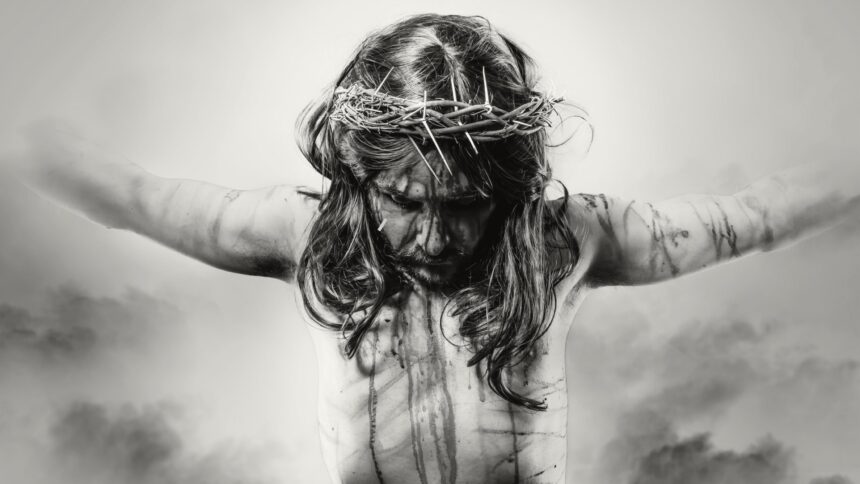Good question! And the simple answer simply is, “Because He loves you so much!” Love for you is the foundational answer, but there’s more to it than that.
Throughout the entire Bible God’s Master Plan for our salvation is very clear. And His plan is predicated upon “redemption/salvation by blood.” In fact, in every one of the 66 books of the Bible, there is some reference to “blood”. Some authors talk about the “thin red line” that runs from cover to cover of God’s Word, referencing His precious shed blood. A word I’ll use throughout this article is REDEMPTION.
The story of Redemption takes us all the way back to the Garden of Eden as described in the Book of Genesis. God created humanity pure and righteous, “In His own image.” The bonds of love and fellowship between God and the people He created were strengthened by communion amid the splendours of the Garden. To Adam and Eve, God gave complete authority and dominion (rulership) over all of His creation. Their freedom was unrestrained but for one exception. “You may freely eat the fruit of every tree in the garden— except the tree of the knowledge of good and evil. If you eat its fruit, you are sure to die.”
Now, Satan enters in the form of a serpent. He’s revengeful because God had banished him from the Garden. He’s out to destroy humanity. He does so by tempting Eve to take of the fruit of the Tree of the Knowledge of Good and Evil. He puts questions and doubts into Eve’s mind when he says, ”Has God said?” followed by the lie, “You won’t die!” And so sin, the disobedience of the creature against the Creator, entered the human family. The result? “All have sinned and fallen short of the glory of God.” (Romans 3:23) Again, “There is no one righteous, not even one.” (Romans 3:10) And it was not just Eve who disobeyed; Adam did as well.
Immediately they knew they had sinned. It says in Genesis 3:7 “the eyes of them both were opened, and they knew that they were naked; and they sewed fig leaves together, and made themselves aprons.”
The Message says, “they made makeshift clothes for themselves.” So, here’s the first time we read about people trying to attempt their own solution to the sin just committed.
And today, it’s the same self made attempts to cover up the issue of sin. Deceit, lies, blame, are but feeble attempts to justify ourselves when we go wrong and follow our own ways instead of God’s way.
But thankfully, we read in Genesis 3:21 that God in His mercy and grace made them “coats of skin, and clothed them.” An innocent animal was sacrificed. Its blood was shed to provide a covering for their sin, and so is ushered in millennia ago the first ray of hope. A Redeemer is promised and God’s act of clothing Adam and Eve presents the great doctrine of deliverance from sin provided through blood-shedding. Only through sacrifice could sinful humanity now stand before a holy God.
Cain and Abel, the two sons of Adam and Eve, clearly show the inherent nature of sin. They were born in the sinful image of their parents. They too could only approach God through sacrifice. Cain offered to God the sacrifice of produce of his farm; but Abel offered his sacrifice from the firstborn animals of his herd. God accepted Abel’s offering but not Cain’s. Cain sulked and debated with Abel about why his sacrifice was accepted while Cain’s was not; eventually, Cain killed his brother Abel only adding to Cain’s guilt. “By faith Abel offered to God a more excellent sacrifice than Cain, by which he obtained witness that he was righteous.” (Hebrews 11:4) The difference? Abel’s sacrifice required blood.
There is a poignant story told in Exodus, the second book of The Bible. The epic account reveals the respective relationships between the Israelites (the oppressed) and the Egyptians (the oppressors) with God. The matter for the Israelites (the Jewish nation today) was settled by the blood shed of the sacrificial lambs. They were to take the blood of each family’s sacrificial lamb and daub it on the door posts and above the doors of their homes. This was God’s only solution for the sins of the people which would satisfy the demands of His own holiness and justice. God in fact told them, “When I see the blood, I will pass over you”. The personal merits or goodness of each Israelite didn’t count with God, and still doesn’t regarding our standing with Him today. And in the following years and centuries, with all the sacrificing of the animals that we read about in the Old Testament, sacrifices that needed to be carried out time after time and year after year, it still was not possible that the blood of bulls and goats or any other animal could take away sin.
Yes, their blood “covered” sin, but it couldn’t “remove” sin.
And so, thankfully, in His great love and grace, God “sent His own Son (Jesus Christ), in the likeness of sinful flesh, on account of sin, and condemned sin in the flesh.” (Romans 8:3) Clearly stated in The Message this verse reads:
“God went for the jugular when He sent his own Son. He didn’t deal with the problem as something remote and unimportant. In His Son Jesus He personally took on the human condition, entered the distorted mess of struggling humanity in order to set it right once and for all.”
So, in reality, what the blood of animals could only do was to cover sin; but the blood Jesus shed when He died on the Cross removes sin from us, “as far as the east is from the west”. (Psalm 103:12) In fact, it was John the Baptist who when he saw Jesus cried out, “Behold the Lamb of God, who takes away the sin of the world.” (John 1:29)
Through the sacrifice of Jesus on Calvary’s Cross and His resurrection three days later, humanity can be delivered from sin and given eternal life.
Though we have all sinned and fallen short of God’s glory, or put another way, we have failed to measure up to the standard of holiness God has set for humanity, Jesus, God’s Son has by His death and resurrection fully paid the price for our sin.
And the amazing thing is, He was sinless, spotless and stainless and He died for us who were full-fledged sinners, and we are brought close to God; but it’s not through any goodness or good deeds, or righteousness on our part. Peter makes it abundantly clear that “Christ has once suffered for sins, the Just (Jesus) for the unjust (us) that He might bring us to God.” (I Peter 3:18) Paul tells us so clearly that Christ is our Substitute. “For God has made Him (Jesus) to be sin for us, who knew no sin; that we might be made the righteousness of God in Him.” (2 Corinthians 5:21)
So, to conclude: Why did Jesus die for me and for you? He died in our place on the Cross to do for us what only He, as God’s Son, could do, and that is to bring salvation and freedom from sin here on earth, and provide for us an eternal home in heaven! There is clearly no other way to eternal life. So what will you do? Will you admit your sin, your need of a Saviour, and ask Him to come into your heart? Trying to be good just isn’t enough.
We all need Jesus.



Leave a Reply